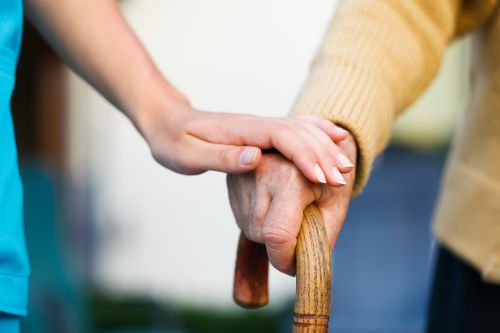Isolated but not alone – aged care workers step up for elders

Aged care used to be a place of hugs and affection, local school children and kindergartens visiting for playgroup, people closely huddled together sharing cups of tea while looking through photo books and a bustling dining room filled with residents and their guests.
Today things look quite different. The warm and inviting entry is filled with health signage and COVID-19 screening questions, visitors are welcomed on entry with a mask and in some cases a Rapid Antigen Test to protect their loved ones during their visit and staff barely recognisable head-to-toe in Personal Protective Equipment (PPE).
This is our new normal but, despite these trying conditions and the changed environment, joy and connectedness remain present as our frontline workers do their best to fill the gaps for those isolated from family.
There are nearly 245,000 older Australians living in residential aged care communities across Australia (AIHW, 2021) with more than 1000 of those services currently in outbreaks and locked down to prevent the community spread of COVID-19.
Social isolation and the increased risk of loneliness through separation can impact the emotional wellbeing of any of us and should be no less important as we age (Larkey, 2020). While the research indicates that quarantining those living in aged care increases the risk of social isolation (Brook & Jackson, 2020; Chu et al. 2020; Simard & Volcer, 2020) it is important for the wider community to be aware that behind these doors remain highly skilled and deeply committed staff who are fighting the good fight to prevent the current widespread community transmission entering, harming and potentially causing death.
Family always comes first, and that is essential to the wellbeing of all residents. However, it is common for residential aged care providers to have employees with years of service who have formed bonds with residents – and their families – that go far beyond than just a client/service provider dynamic. Put simply, they care deeply. To deny these relationships exist is to devalue the truly important work those on the frontline are doing, often for very little financial reward.
During the last two years, residential aged care workers have continued to attend their workplaces when many others around the country, and indeed the world, have been able to carry out their employment from the comfort and relative safety of their homes.
For those in their care, isolated through no fault of their own from loved ones, aged-care workers have willingly taken on a pseudo-family role, providing not just medical and physical care, but supporting mental, emotional and spiritual wellbeing.
Our frontline aged care workers are the people who have been stepping in to organise important anniversary dinners and birthday celebrations – creating wherever possible, moments of light and joy to break up the dark.
They’re the ones in full PPE on searing Queensland summer days; they’re embracing new technology in a bid to connect families with loved ones; they’ve missed Christmases and school holidays with their own families; and worked into the early hours to stay holding a hand or to backfill for an isolating colleague, stopping only when their manager insists they do so.
Jude Emmer
CEO
Wesley Mission Queensland
